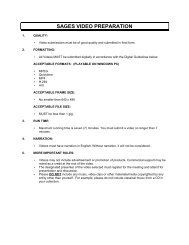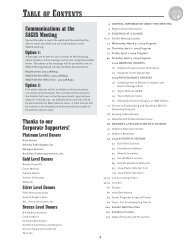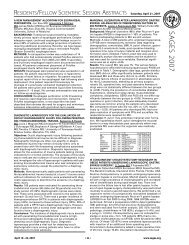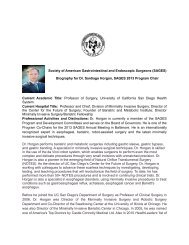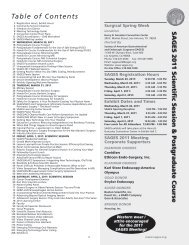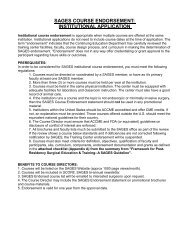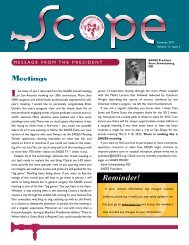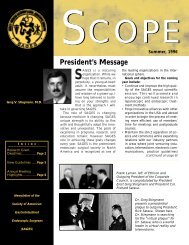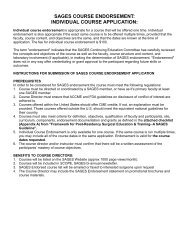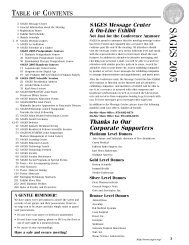2005 SAGES Abstracts
2005 SAGES Abstracts
2005 SAGES Abstracts
Create successful ePaper yourself
Turn your PDF publications into a flip-book with our unique Google optimized e-Paper software.
POSTER ABSTRACTS<br />
<strong>SAGES</strong> <strong>2005</strong><br />
OLAR showed 2 cases of anastomotic leakage, 2 wound infection,<br />
2 paralytic ileus and one atelectasis . In long-term results<br />
of LLAR, there were one lung metastasis, one lymph metastasis<br />
and one death from the other disease . We showed a recurrence<br />
in 5 cases in OLAR, and including one peritoneal and<br />
peritoneal metastasis and 4 liver metastases. In LLAR, the<br />
number of removed lymph node was greater than OLAR, and<br />
mean blood loss was less than OLAR. There was no difference<br />
to operation time and days of hospitalization in both groups.<br />
[conclusion s] LLAR showed better curability and safeness of<br />
treatment for advanced rectal cancer by its good long term<br />
prognosis , little quantity of operative haemorrhage and complications.<br />
However, from a complication such as transient urination<br />
disorder, the hospitalization was equal with OLAR. By<br />
further improvement of operative procedure such as nerve<br />
preservation utilizing magnifying view under laparoscopy,<br />
LLAR could become the standard therapy for advanced rectal<br />
cancer.<br />
P127–Colorectal/Intestinal Surgery<br />
LAPAROSCOPIC-ASSISTED ABDOMINO-PERINEAL RESEC-<br />
TION FOR RECTAL CANCER BY 4 PORTS METHOD, Minoru<br />
Naito MD, Hideo Ino MD,Masakazu Murakami MD,Nobuyoshi<br />
Shimizu MD, Department of Cancer and Throcic Surgery<br />
,Okayama University Graduate School of Medicine and<br />
Dentistry,Okayama,Japan<br />
We have performed 5 cases laparoscopic-assisted<br />
abdominoperineal resection for patients with rectal cancer<br />
between May 1999 and August 2004. All cases were successfully<br />
performed laparoscopically without intraoperative complication.<br />
The patient was placed in the lithotomic position<br />
with Trendelenburg position.We used four ports,initial port for<br />
a laparoscope was inserted just right side of the<br />
umbilicus,then CO2 pneumoperitoneum was created.After<br />
pneumoperitoneum was initiated,three ports were<br />
placed(suprapubic and bilateral pararectal). We used a medial<br />
approach for colorectal mobilization and had performed all<br />
cases with autonomic nerve preservation.Finally a 3cm circular<br />
incision was made over the port site in the left lower quadrant<br />
and the stapled bowel end was pulled through extraperitoneal<br />
for colectomy. Results:The mean age was 78years .The male to<br />
female ratios were 1:1.5.The mean operative time was 360minutes<br />
.The mean hospital stay was 12days . Conversion to open<br />
surgery was none?DNo operative mortality, no portsite metastasis<br />
and morbidity.All patients are alive without recurrence.<br />
Laparoscopy affords improved visualization of the rectum in<br />
the confined space of the pelvis. Laparoscopic-assisted<br />
abdominoperineal resection for patients with rectal cancer is a<br />
feasible and safe operation . Recurrence rate or long term<br />
functional outcome needs longer follow up.<br />
P128–Colorectal/Intestinal Surgery<br />
CLINICAL OUTCOME OF LAPAROSCOPIC COLORECTAL CAN-<br />
CER SURGERY, Takeshi Naitoh MD, Takashi Tsuchiya<br />
MD,Satoshi Akaishi MD,Hiroshi Honda MD,Masao Kobari MD,<br />
Department of Surgery, Sendai City Medical Center<br />
[Backgrounds] Laparoscopic colorectal cancer surgery has<br />
been widely accepted because of less pain, faster recovery and<br />
good cosmetic results. Although several authors presented<br />
results of prospective studies which support advantages of<br />
laparoscopic colorectal cancer surgery, an oncological validity<br />
of this surgery is not well analyzed yet. The aim of this study<br />
is to assess the clinical outcome of the laparoscopic colorectal<br />
cancer surgery in our hospital. [Patients and Methods] During<br />
June 1999 and Aug. 2004, we operated more than 700 cases of<br />
colorectal cancer patients. Of those 205 patients underwent<br />
laparoscopic colorectal surgery. We assessed an operative<br />
time, estimated blood loss, postoperative complications, duration<br />
of hospitalization, and clinical outcome, retrospectively.<br />
[Results] Male female ratio was 118:87, and mean age of these<br />
patients was 64.6 year-old. Among these cases, 71 tumors<br />
were located in the cecum or ascending colon, 20 in the transverse<br />
colon, 7 in the descending colon, 55 in the sigmoid<br />
colon, and 52 in the rectum. Among 52 cases of rectal cancer,<br />
17 cases were localized in Rs, which is rectosigmoid region, 30<br />
in Ra, which is rectum above the peritoneal reflection, and 5 in<br />
158 http://www.sages.org/<br />
Rb, which is rectum below the peritoneal reflection according<br />
to the Japanese classification of colorectal cancer. Histological<br />
T numbers of the tumor according to the UICC classification<br />
were as follows; 113 cases of T1, 43 cases of T2, 33 of T3, and<br />
11 of T4. Forty nine cases (23.9%) of them were node-positive.<br />
Mean operative time was 178 min., and mean estimated blood<br />
loss was 62 ml. Twelve cases (5.9%) were converted to conventional<br />
surgery because of the severe adhesion.<br />
Postoperative complications were identified in 16 cases (7.8%),<br />
of those 6 cases represented an anastomotic leakage, and 5 of<br />
them required further operation. Two cases were complicated<br />
with postoperative hemorrhage which required reoperation.<br />
No operative mortality was observed in these patients. Mean<br />
postoperative hospitalization was 16 days. Mean follow-up<br />
time was 23 months. Five patients have tumor recurrence; 1<br />
case with local recurrence, 2 with liver metastasis, 1 with lung<br />
metastasis, and 1 with peritoneal carcinomatosis. Only one<br />
patient with local recurrence died of cancer 2 years after initial<br />
surgery, so far. [Conclusion] Although further evaluation is<br />
mandatory, laparoscopic colorectal cancer surgery is safe and<br />
would be oncologically adequate procedure.<br />
P129–Colorectal/Intestinal Surgery<br />
LAPAROSCOPIC SURGERY FOR DIVERTICULAR DISEASE<br />
COMPLICATED BY ENTERIC FISTULAS, Scott Q Nguyen MD,<br />
Celia M Divino MD,Anthony Vine MD,Mark Reiner MD,Lester B<br />
Katz MD,Barry Salky MD, Mount Sinai Medical Center<br />
Introduction. Enteric fistulas complicate diverticular disease in<br />
up to 20% of cases. Elective laparoscopic surgery for uncomplicated<br />
diverticular disease is considered safe and effective,<br />
however little data exists for disease complicated by fistulas.<br />
This study describes a series of patients who underwent<br />
laparoscopic assisted sigmoid resection for diverticulitis complicated<br />
by fistulas.<br />
Methods. A retrospective chart review was performed of<br />
patients who underwent laparoscopic treatment of enteric fistulas<br />
complicating diverticular disease by four surgeons specializing<br />
in minimally invasive surgery at the Mount Sinai<br />
Medical Center.<br />
Results. During a 10-year period (1994-2004), 14 patients<br />
underwent elective laparosopically assisted sigmoid resections<br />
for diverticular disease complicated by enteric fistulas. The<br />
average age was 62 and the male/female ratio was 10:4.<br />
Twenty nine percent of patients had previous abdominal surgery<br />
and 21% had multiple fistulas. There were 8 colovesical, 5<br />
enterocolic, 2 colovaginal, 1 colosalpingal, and 1 colocutaneous<br />
fistulas. 100% patients successfully underwent sigmoid<br />
resection and 2/14 (14%) required additional bowel resections.<br />
No cases were proximally diverted. Thirty-six percent of cases<br />
were converted to open, all due to dense adhesions and<br />
severe inflammation resulting in difficult dissection. The mean<br />
operative time was 209 minutes and the mean blood loss was<br />
326 ml. There were two (14%) postoperative complications,<br />
including one self-limiting anastamotic bleed and one prolonged<br />
ileus. No anastamotic leaks occurred and there were<br />
no mortalities. The mean postoperative stay was six days.<br />
Conclusions. Laparoscopic management of diverticular disease<br />
complicated by fistulas can be performed effectively and safely<br />
with minimal morbidity and mortality. The conversion rate is<br />
higher than in uncomplicated cases of diverticulitis and is<br />
associated with severe adhesions and inflammation interfering<br />
with safe laparoscopic dissection.<br />
P130–Colorectal/Intestinal Surgery<br />
LESS INVASIVE SURGERY ON THE PATIENTS WITH SEVERE<br />
CONSTIPATION, Hirotsugu Ohara MD, Yasuhiko Masuda<br />
MD,Toshiyuki Hirai MD, Department of surgery , Fujieda Heisei<br />
Memorial Hospital , Fujieda , Sizuoka , Japan<br />
INTRODUCTION : Until now, operation for severe constipation<br />
have seldom been performed, because severe constipation<br />
was most common in the elderly or the institutionalized<br />
patients, and in patients with a variety neurologic disorders.<br />
Recently, we have been able to perform less invasive surgery<br />
on the the patients with severe constipation. In all cases we<br />
achieved good results by our own unique method. This<br />
method, including the indication to operate, will be discussed.<br />
METHODS AND PROCEDURES : At first, these diseases are



